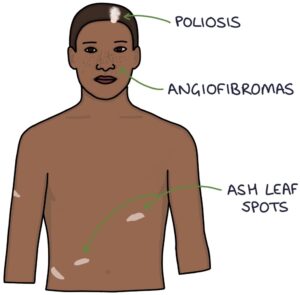Tuberous sclerosis is an autosomal dominant genetic condition that affects multiple systems.
The characteristic feature is the development of hamartomas, which are benign tissue growths. Hamartomas cause problems based on the location of the lesion. They commonly affect the:
- Skin
- Brain
- Lungs
- Heart
- Kidneys
- Eyes
Tuberous sclerosis is caused by mutations in either:
- TSC1 gene on chromosome 9, which codes for hamartin
- TSC2 gene on chromosome 16, which codes for tuberin
Hamartin and tuberin interact with each other to control the size and growth of cells. Abnormalities in one of these proteins lead to abnormal cell size and growth.
Features
Skin features include:
- Ash leaf spots (depigmented areas of skin shaped like an ash leaf)
- Shagreen patches (thickened, dimpled, pigmented patches of skin)
- Angiofibromas (small skin-coloured or pigmented papules that occur over the nose and cheeks)
- Ungual fibromas (circular painless lumps that slowly grow from the nail bed and displace the nail)
- Cafe-au-lait spots (light brown “coffee and milk” coloured flat pigmented lesions on the skin)
- Poliosis (an isolated patch of white hair on the head, eyebrows, eyelashes or beard)

Neurological features include:
- Epilepsy
- Learning disability
- Brain tumours
Other features include:
- Rhabdomyomas in the heart
- Angiomyolipoma in the kidneys
- Lymphangioleiomyomatosis in the lungs
- Subependymal giant cell astrocytoma in the brain
- Retinal hamartomas in the eyes
Management
There is no treatment for the underlying gene defect. Management is supportive and involves monitoring and treating complications, particularly epilepsy.
In specific circumstances, mTOR inhibitors (e.g., everolimus or sirolimus) may be used to suppress the growth of brain, lung or kidney tumours.
Last updated October 2023
Now, head over to members.zerotofinals.com and test your knowledge of this content. Testing yourself helps identify what you missed and strengthens your understanding and retention.

